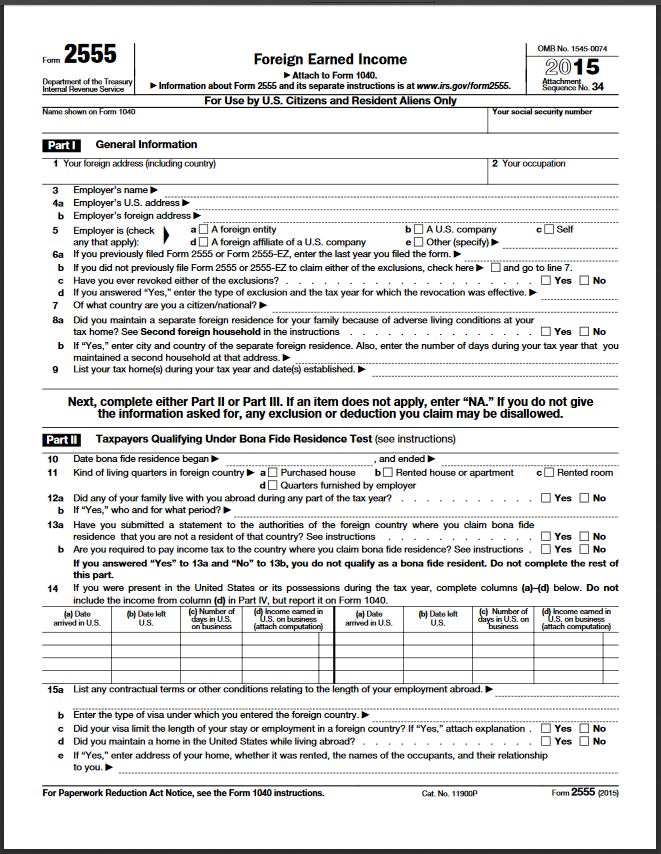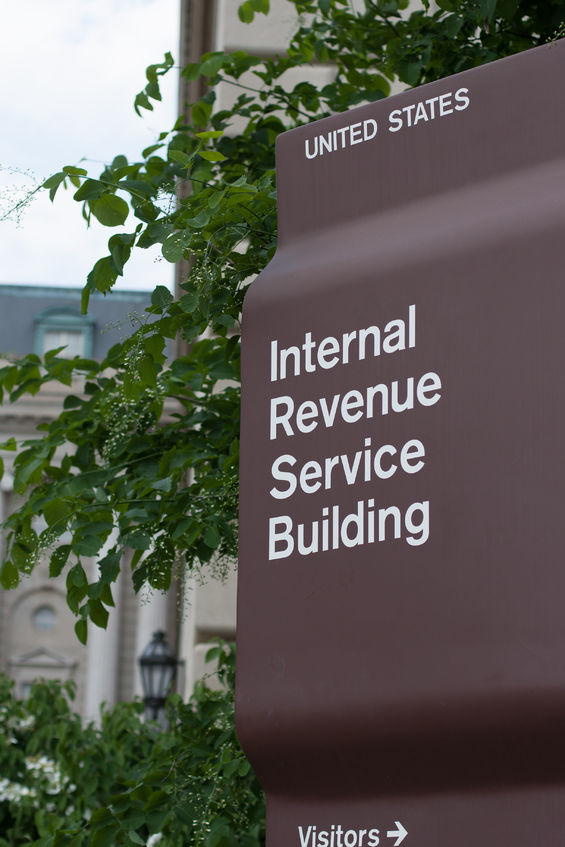Lessons Learned From the Foreign Earned Income Exclusion-Form 2555
 The following case study represents an actual case and illustrates the hazards associated with expatriates who have relied upon the representations of recruiters or inexperienced tax preparers concerning the tax implications of working overseas. If you are considering working overseas and are in contact with an offshore recruiter or directly dealing with a prospective employer, you need to understand the rules and limitations pertaining to the foreign earned income exclusion before committing to a job overseas. More often than not, a recruiter or your tax return preparer is not the best place to start for answers.
The following case study represents an actual case and illustrates the hazards associated with expatriates who have relied upon the representations of recruiters or inexperienced tax preparers concerning the tax implications of working overseas. If you are considering working overseas and are in contact with an offshore recruiter or directly dealing with a prospective employer, you need to understand the rules and limitations pertaining to the foreign earned income exclusion before committing to a job overseas. More often than not, a recruiter or your tax return preparer is not the best place to start for answers.
A tax attorney can assist you in quantifying the tax benefits and risks related to working overseas. Remember! Each situation is different. Failure to quantify the benefits and risks prior to accepting a position can have dire consequences, particularly where the taxpayer is a highly compensated senior level executive. In addition to preventing unintended tax consequences,a meaningful analysis may be useful in negotiations with a prospective employer and may also provide financial insight for purposes of evaluating multiple job offers from potential employers who are located in different countries.
Likewise, for those individuals who are already working overseas, an assessment of your tax liability by a competent tax attorneymay prevent ill-advised decisions that result in serious tax ramifications.
The Foreign Earned Income Exclusion Form 2555 – A Case Study *
 Tim is a senior level construction engineer who is being actively recruited by a number of overseas search firms who specialize in the placement of U.S. senior level professionals in the Middle East. Overseas Job Placements Limited, whose principal place of business is Qatar, contacts Tim about a job opening with a construction firm in Qatar for an Executive Vice President of Development. The annual compensation package includes a base salary of $500,000, together with a performance bonus. Additionally, the package includes a housing allowance, use of a company car, paid vacation as well as sick days and other perks.
Tim is a senior level construction engineer who is being actively recruited by a number of overseas search firms who specialize in the placement of U.S. senior level professionals in the Middle East. Overseas Job Placements Limited, whose principal place of business is Qatar, contacts Tim about a job opening with a construction firm in Qatar for an Executive Vice President of Development. The annual compensation package includes a base salary of $500,000, together with a performance bonus. Additionally, the package includes a housing allowance, use of a company car, paid vacation as well as sick days and other perks.
The homepage of the recruiter’s website contains following tag line: “Work in Qatar without paying any income taxes.” In addition, the recruiter repeatedly tells Tim: “This income is tax free.”
Tim also speaks with his tax return preparer who tells him that he does not have to worry about filing U.S. tax returns since the earned income exclusion eliminates all taxable income for U.S. tax purposes. The return preparer makes this representation based solely upon his general awareness that the foreign earned income exclusion exists.
Tim accepts the position with Construction in Qatar Limited in late June of 2008. On July 1, 2008Tim relocates to Qatar together with his family, and begins working. While in Qatar,Tim opens several Foreign Financial Accounts, including savings, checking and brokerage accounts. Tim receives his bi-weekly salary, bonuses and employer reimbursements by direct deposit into his checking account. After paying his monthly expenses, Tim transfers the excess of his compensation from his checking account to either the savings or brokerage account.Tim works in Qatar from July 1, 2008 to December 31, 2014. At the conclusion of the project Tim and his family travel for five months prior to returning to the United States. On December 31, 2014 Tim’s foreign financial account balances were as follows: (i) checking account $39,000; (ii) savings account $618,000; and (iii) brokerage account $317,282.
While working in Qatar, Tim’s tax return preparer files a Federal tax return for 2008, reporting Tim’s U.S. earnings from Perini Construction for the period January 1, 2008 to June 28, 2008. However, the tax return preparer does not report Tim’s foreign earned income from Qatar for the period July 1, 2008 thru December 31, 2008, nor does he report any of the income Tim received from his foreign financial accounts, including his checking, savings and brokerage accounts. Finally, Tim’s tax return preparer checks the “no” box in response to questions 7a and 7b, contained in Part III of Schedule B. Tim signs the return under penalty of perjury and files the tax return prior to the due date.
For 2008, Tim also fails to file TDF-90-22.1, since the tax return preparer was not aware of the Bank Secrecy Act and the reporting requirements. As a result, the tax return preparer never made an inquiry whether Tim had an interest in or signatory authority over a foreign financial account at any time during 2008.
On the advice of the recruiter and representations from his tax return preparer, Tim concludes that all of his income is excluded and that he is not required to file a federal income tax return. Tim is also unaware of either the Bank Secrecy Act or the Foreign Asset Tax Compliance Act and the reporting requirements. Consequently, Tim fails to file a U.S. Federal Income Tax Return as well as FinCen Form 114 (formerly known as TDF-90-22.1) for the tax years2009-2014. Tim also fails to file Form 8938 for the years 2011-2014.
While traveling overseas with his family, Tim meets a U.S. immigration attorney named Jeremy at an expat bar in Bangkok. After swapping stories, Tim states: “Working overseas is great. You never have to pay any income taxes.” Jeremy responds: “What are you talking about? Don’t you know that you are subject to income tax on your worldwide income?” Tim then states: “You must be mistaken. My tax return preparer told me that all of my foreign earned income is excluded under the foreign earned income exclusion. He also told me that I do not need to file U.S. Income Tax Returns” Jeremy, who is in disbelief at what he is hearing, tells Tim: “The foreign earned income is subject to a ceiling that is annually indexed for inflation. Any amounts over the ceiling are subject to income tax in the U.S. In addition, you have to report any income that you receive from a foreign financial account and may have other financial reporting responsibility.” Tim then asks Jeremy if he knows a good tax attorney in the states. Jeremy provides the contact information for one of his colleagues, who are a tax attorney.
Upon his return to the states in June of 2015, Tim contacts the tax attorney, who reviews Tim’s tax situation and advises him of the following:
- U.S. taxpayers are taxed on their worldwide income, and accordingly, must file Federal Income Tax Returns if they meet the minimum filing threshold;
- The amount that may be excluded under the foreign earned income exclusion is subject to a ceiling that is annually indexed for inflation;
- Tim’s foreign earned income for each of the tax years 2008-2014 substantially exceeds the foreign earned income exclusion for each of the preceding six years;
- Any income in excess of the foreign earned income exclusion is subject to U.S. income tax;
- The maximum amount of earned income that may be excluded for each year is ($87,600 for 2008, $91,400 for 2009, $91,500 for 2010, $92,900 for 2011, $95,100 for 2012, $97,600 for 2013, $99,200 for 2014 and $100,800 for 2015);
- S. taxpayers must also report any income received from a Foreign Financial Account on Schedule B and must also report the sale of securities, and any gain or loss on Schedule D;
- In addition, a U.S. taxpayer must file FinCen Form 114 and report any interest in or signatory authority over any Foreign Financial Account, where the aggregate balance at any time during the tax year exceeds $10,000;
- A U.S. taxpayer must also make a disclosure on Schedule B, Part III, questions 7a and 7b concerning whether the taxpayer had an interest in or signatory authority over a foreign financial account at any time during the tax year;
- Depending upon the foreign financial account balances, Tim is required to file Form 8938 for the tax year 2014 and may be required to file Form 8938 for 2011-2013; and
- Tim should immediately make an application for participation in the Offshore Voluntary Disclosure Program. The tax attorney further explains to Tim that ifhe is accepted into the Program, Tim will have to:
- File Federal Form 1040X (Amended Federal Income Tax Return) for 2008 and Form 1040 for the years 2009-2014;
- File FinCen Form 114 for the tax years 2008-2014;
- Pay any income tax due for the six year period,together with a 20% accuracy related penalty and interest; and
- Pay a miscellaneous offshore penalty equal to 27.50 of the highest aggregate balance for any one year during the preceding six years. After reviewing Tim’s bank and brokerage statements, the tax attorney concludes that the highest aggregate balance was in 2014 and that he estimates the miscellaneous offshore penalty will be $267,928.
These tragic results could have been avoided, had Tim consulted with a tax attorney, prior to accepting the position or, at the very least, while he was working overseas.
Foreign Earned Income Exclusion-Qualifications and Limitations
 The foreign earned income exclusion is based upon the concept that a U.S. Citizen or resident alien is subject to federal income tax on the individual’s worldwide income. This concept is consistent with the definition of “gross income, “contained in I.R.C. § 61.If a U.S. taxpayer lives overseas and meets certain qualifications, the taxpayer may be able to exclude foreign earned income up to an amount that is annually indexed for inflation. A taxpayer may also be entitled to the foreign housing exclusion or deduction.
The foreign earned income exclusion is based upon the concept that a U.S. Citizen or resident alien is subject to federal income tax on the individual’s worldwide income. This concept is consistent with the definition of “gross income, “contained in I.R.C. § 61.If a U.S. taxpayer lives overseas and meets certain qualifications, the taxpayer may be able to exclude foreign earned income up to an amount that is annually indexed for inflation. A taxpayer may also be entitled to the foreign housing exclusion or deduction.
The following U.S. taxpayers are eligible to claim the foreign earned income exclusion:
- A U.S. citizen who is a bona fide resident of a foreign country or countries for an uninterrupted period that includes the entire tax year;
- A U.S. resident alien who is a citizen or national of a foreign country, with which the United States has an income tax treaty in effect and who is a bona fide resident of a foreign country or countries for an uninterrupted period that includes an entire year; or
- U.S. Citizen or U.S. resident alien who is physically present in a foreign country for at least 330 full days during any period of 12 consecutive months.
A U.S. taxpayer who falls into one of the three categories is eligible to claim the foreign earned income exclusion and the foreign housing exclusion or deduction, provided the individual’s tax home is a foreign country throughout the taxpayer’s period of bona fide residence or physical presence.
The term “tax home” is generally considered to be in the area of the taxpayer’s main place of business, employment or post of duty, regardless of where the taxpayer maintains the family home. The taxpayer’s tax home is where he or she regularly or permanently is engaged to work as an employee or self-employed individual.
In addition,a taxpayer’s tax home must be in a foreign country. A foreign country is considered to be any territory under the sovereign control of a government other than the United States. The term “foreign country,” does not include possessions of the United States.
According to the IRS, Only Earned Income Can Be Excluded
 The term “foreign earned income” for purposes of computing the foreign earned income exclusion generally includes wages,salaries, professional fees and other compensation received for personal services performed by an individual in a foreign country for the period which the taxpayer meets the tax home test, and is either a bona fide resident or meets the physical presence test. Foreign earned income also includes self-employment income as well as non-cash income such as employer paid housing, or use of an automobile and allowances and reimbursements.
The term “foreign earned income” for purposes of computing the foreign earned income exclusion generally includes wages,salaries, professional fees and other compensation received for personal services performed by an individual in a foreign country for the period which the taxpayer meets the tax home test, and is either a bona fide resident or meets the physical presence test. Foreign earned income also includes self-employment income as well as non-cash income such as employer paid housing, or use of an automobile and allowances and reimbursements.
Foreign earned income does not include distributions of corporate earnings or profits in excess of a reasonable allowance for compensation for a taxpayer’s personal services, nor does it include pension and annuity income, or social security benefits. Furthermore, interest, ordinary dividends, capital gains and alimony as well as other income generally considered to be “passive” are also excluded from the definition of foreign earned income. An example of other passive income would be rental income received with from foreign real estate.
The foreign earned income exclusion is claimed on either Form 2555 or Form 2555EZ, depending upon the circumstances. The foreign earned income that can be excluded varies from year to year due to indexing for inflation. The maximum amount of income that a taxpayer may exclude for the tax year 2014 is $99,200.
In addition to the foreign earned income exclusion an eligible taxpayer may be entitled to foreign housing exclusion, however, a taxpayer’s housing expenses may not exceed certain limits, which are determined by the location, where the housing expenses are incurred.
If you are planning to work overseas or are already working abroad, you need to be mindful of a number of things, including, whether you are subject to income tax in the country you will be or are already performing the services, and if so, whether foreign income taxes will or are being withheld and paid on your behalf.Additionally, if foreign income taxes are withheld, you will need to examine the foreign country’s effective tax rate to determine whether the foreign income taxes withheld will offset the U.S. tax liability on the non-excluded portion of your foreign earned income. If the effective tax rate for the foreign country is less than the U.S. effective rate, you may be subject to U.S. tax and need to consider making estimated tax payments.
Likewise, if you are performing services in a country where no income tax is imposed, and your foreign earned income substantially exceeds the annual exclusion, you need to make U.S. estimated tax payments to cover the U.S. tax on that portion of the foreign earned income, which exceeds the amount excluded on Form 2555. Failure to provision for the additional tax can result in stiff penalties as well as interest on the unpaid balance. Finally, depending upon the particular circumstances, you may also have other reporting responsibility, including but not limited to, FinCen Form 114 and Form 8938.
If you are self-employed you also need to be aware that your foreign earned income may be subject to self-employment tax, even if the foreign earned income exclusion results in no federal income tax due. Unless the foreign country in which you are performing the services is a party to a totalization agreement with the United States and the foreign equivalent of U.S. social security taxes have been withheld, you will be subject to self employment taxes on any self-employed income. The self-employment tax is independently computed without regard to taxable income.
CONCLUSION
Many of these issues can be avoided through proper tax planning with the assistance of a tax attorney, who will analyze your particular situation. Depending upon your anticipated income level, it maybe prudent to have a pro forma tax projection prepared that reflects: (i) the amount of foreign earned income; (ii) the amount of foreign earned income estimated to to be excluded; (iii) the foreign country’s effective tax rate, if any; (iv) the amount of foreign income tax, if any, to be withheld; and (v) whether the individual performing the services overseas is subject to self-employment tax. This exercise should aid a taxpayer in deciding whether working overseas makes financial sense.
*All names of individuals or businesses in this Case Study have been changed to protect their privacy.


